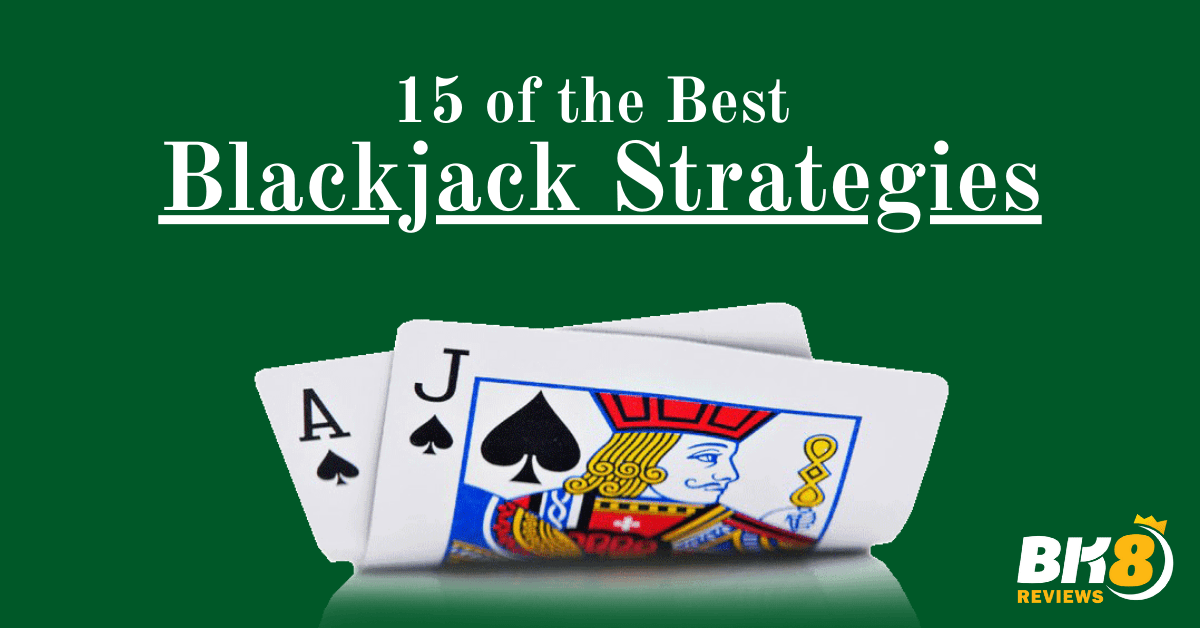15 of the Best Blackjack Strategies

Playing blackjack is one of the most exciting table games you can play in a casino. It’s also one of the simpler table games to learn how to play, which means it’s perfect for beginners. But to make the most of your time at the blackjack tables, there are several strategies you can employ from counting cards to employing basic betting tactics. We’ll look at 15 strategies to help you improve your blackjack game in this article.
Table of Contents
#1. Make Sure To Double-Down On A Hard 11
Through one exception, you’ll earn more cash if you double down on a hard 11 versus every dealer’s upcard as opposed to hitting in all rounds, save for one. You are marginally better off striking vs a dealer Ace than double down if you are facing a multi-deck game in which the conditions stipulate that the dealer need to stay on soft 17.
#2. Always Split A Pair Of Eights And Aces Into Two
No matter what the dealer’s upcard is, you must always divide an 8 as well as an Ace if you have a set of 8. Unfortunately, whether the dealer’s upcard is indeed a 9, 10, or Ace, most players will refuse to split with a couple of 8s in this situation. They argue that, since they are at a significant disadvantage in this scenario, there is no need to risk additional money by sharing the pot.
Something they wouldn’t realise is that instead of dividing your hands and dealing two hands, each beginning with an 8, you are somewhat of an underdog than if you were to play one round of 16. (and hitting). In other terms, breaking 8s vs a 9, 10, or Ace will cause you to lose less money down the road than striking a hard 16. Overall, always splitting 8s and Aces is the ideal approach since, in the instance of Aces, it brings in large profits for the player; and, within the situation of 8s, it will enable you to reduce your deficits or earn more money depending on the dealers up card.
As long as you’re playing a dual deck match with H17 or H17 plus NDAS, one of the best strategies in blackjack is to give both of your 8s to your dealer instead of splitting them.
#3. A Pair Of 5s Or Tens Should Never Be Split
As a result, if you have a set of 5s, getting a 10 is much more challenging. Instead, separate the 5s and have two sets, each opening with a 5, and take a one- or more-card draw to it. Despite the fact that splitting 10s is a winning move in the vast majority of cases, holding them with as a 20 is an even better winning play throughout all situations.
#4. Use A Hard 12 Against A Dealer’s Two Or Three Up Card
The majority of players will bail out and remain on their 12 since they are afraid of being busted in this scenario. What this boils down to is that vs a dealer’s 2 or 3 up cards, you will waste money down the road regardless of either you stand or hit; nevertheless, you would lose less cash by hitting (even if you incur the chance of busting part of the time), thus it is the better approach.
#5. When The Dealer’s Up Card Is 9, 10, Or Ace, Always Click Ace-7 (Soft 18)
As a result, when the dealer shows a “strong” up card, players tend to fold on soft 18 (A-7), believing that they would win with any hand totalling 18. (e.g., 9, 10, or Ace). These are the details. Even if the dealer has a 9, 10, or Ace, and you have an A-7, you will be in the minority whether you stand or hit; but, if you hit an A-7, you will be less of an outcast.
In other words, you’ll end up with a better likelihood of success in blackjack if you get a little card (such as an ace, 2, or 3). You may keep the hand even if you get one of the four ten-valued cards. You should aim for a soft 19–21 or a hard 17–21 by hitting A-7 every time the dealer reveals a 9, 10, or Ace. This is the ideal approach for you.
(One exception should be made to the preceding approach.) In a single-deck S17 game, if the dealer’s upcard is an Ace, you’re somewhat better off folding.)
#6. Any Time The Dealer’s Up Card Is Nine Or Less, Always Double Down On The 10
When you have a two-card 10 and the dealer has an upcard of 9 or less, doubling down is the optimal move since you are the favoured. Double down on 10 if the dealer’s upcard is a 9 or below.
#7. The Following Is What You Should Do If The Rules State That The Dealer Must Hit Soft 17
It’s always a good idea to place two bets when you have a hard 11, a soft 19 (A-8) or an A-7 against a dealer’s 6.
The following are the three doubling strategy adjustments you should make if you’re playing an H17 game as opposed to the identical game with S17.
(It’s worth noting that the surrender technique has also changed.)
#8. When The Dealer’s Up Card Is A 5 Or 6, Always Double Down A-2 Through A-7
To increase your chances of winning, it’s a good idea to double down on an A-2 through an A-7 when the dealer’s upcard is a 5 or 6.
Based on the number of decks and playing regulations, the span of the dealer’s up cards in which you might double down on soft 13 to 18 changes. As an example, whether you were dealt an A-3 in a double-deck match with H17, you should double down not just when the dealer’s upcard is 5 or 6, as well as versus a 4. Double down using A-2 to A-7 only when the dealer’s upcard is a 5 or 6.)
#9. When The Dealer’s Up Card Is A 7, Always Place A Pair Of 9s
When the dealer’s upcard is a 9, most players know to split a pair of 9s instead of a pair of 10. When the dealer reveals a 7, they drop the ball. In this situation, standing is preferable to dividing since you’ll make a little more money standing. The following is a simple method to recall the most effective strategies in blackjack.
Even though there exist four times that many ten-value cards in a deck as other tiers, there is a high probability that the dealer has a 10 in the hole. The dealer’s upcard is typically a 7, which means she has a pat 17. Because your pair of 9s is an 18, you’d beat her 17 if she hit, therefore standing is the preferable option.
#10. Always Surrender Hard 16 To A Dealer’s 9, 10, Or Ace Up Card, As Well As Hard 15 To A Dealer’s 10 Up Card
When the dealer has a power-up card, a hard 15 or 16 are among the worst hands to have in blackjack (e.g., 9, 10, or Ace). Even if you’re the underdog, surrendering the aforementioned hands against the dealer’s up cards will reduce your costs. In the long term, surrender is the greatest option since it reduces costs.
(Note: There are additional hands where surrendering is the optimal option depending on the number of decks of cards played and the blackjack regulations.)
#11. In A Single-Deck Game, Always Double Down On 8 Against The Dealer’s 5 Or 6 Up Card
If you’re playing with two decks or more, you can never double down on an 8, but if you’re playing with a single deck, the chances of blackjack change in favour of double down against hitting.
One exception to the above optimal approach is the inclusion of a pair of 4s. DAS dictates that you must break a set of 4s rather than double down when dealt a twin of 4.
#12. Before You Deal With A Set Of 2s Or 3s Against A Dealer’s 2 Or 3 Upcard, Be Sure To Split Any Das And Hit Any Das Not Allowed By The Rules
Since splitting a set of 2s gives you an 11 when the card is a 9, or an 8, you may wager more money when the card is a 10 if the circumstance is favourable. This is why breaking is better with DAS than doubling down.
You must break a set of 2s even if the dealer reveals a 3-up card in a single-deck game since the only exception is NDAS (No Double After Splitting).
#13. Do Not Place An Insurance Bets Ever
As a result, your best option is to avoid placing an insurance bet if the dealer’s upcard is an Ace. Even if you are dealt a strong hand (such as a 19 or a 20), you should avoid placing an insurance bet. Because the insurance bet’s return (2 to 1) is smaller than the dealer’s probability of having blackjack, it’s a loser.
If you have a blackjack hand and the dealer has an ace up, she will give you “even money,” which is the same as placing an insurance bet. The temptation to be paid even money when you have a blackjack is great but resist the urge. You will end up winning more money by rejecting the even money payout in the long run.)
#14. Take A Stand If Your 16 Is Multi-Card Vs A Dealer’s 10 Up Card
Only the player’s hand total, as well as the dealer’s upcard, are considered in one of the conventional blackjack strategies. When dealt a hard 16, and the dealer’s upcard is a 10, the recommended course of action is to hit (assuming surrender is not offered).
Even though this approach is accurate, you may enhance your game’s accuracy by considering if your 16 is a multi-card 16. If you’re dealt a 7-5-4 hand and the dealer has an upcard of 10, your best bet is to fold.
#15. Avoid Playing A 6 To 5 Blackjack Game At All Costs
In the past, the odds on a blackjack hand have always been 3 to 2. As an example, you’ll get $15 if you wager $10 and get an (untied) blackjack as a result. Many casinos now only payout 6 to 5 odds on a winning player’s blackjack hand. (In a 6 to 5 game, a $10 bet would get you just $12.)
In a single-deck game of 6 to 5, the house advantage rises to 1.45%; furthermore, in a double- or multi-deck game, the house edge rises to above 2%. To maximise your chances of winning, stick to blackjack games with a 3 to 2 blackjack payout ratio.
Conclusion
Whether you are playing for fun or profit, it is important to understand the rules and strategies of blackjack. The game is simple enough that many players believe they can rely on their instincts to guide them through the game.
These strategies may work for some, but blackjack is much more complex than it seems. We hope you found this article to be helpful and we wish you luck at the tables. If you are interested to play a round of online blackjack, feel free to join BK8 with lots of exciting promotions and bonuses.
- Tips and Strategies to Win at Sic Bo - January 14, 2022
- Top 7 Helpful Tips for Playing Slot Machines - December 13, 2021
- Learn About Baccarat Rules And Odds - November 19, 2021
